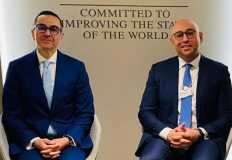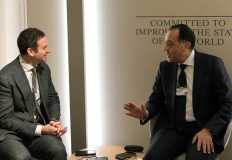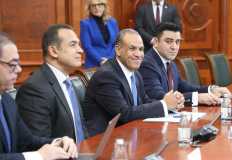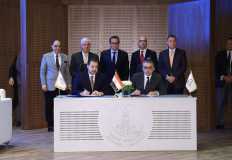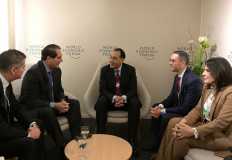Minister of Planning and Economic Development and International Cooperation, Dr. Rania El-Mashat attended a meeting of the special committee formed by the House of Representatives to review and analyze the new administration's proposed work program for the coming period (2024/2025 - 2026/2027). The meeting was headed by Counselor Ahmed Saad, the First Undersecretary of the Council.
Member of Parliament (MP) Mohamed Abu El-Ainain, Undersecretary of the House of Representatives had attended, as a special session was held to discuss the program with the participation of Dr. Hassan El Khatib, Minister of Investment and Foreign Trade, and Mr. Ahmed Kjok, Minister of Finance. Counselor Mahmoud Fawzi, Minister of Parliamentary Affairs, Legal Affairs and Political Communication, also participated in the session.
The Minister shed light on the government's program, especially the first axis related to building the Egyptian citizen and enhancing his well-being, and the third axis related to building a competitive investment-friendly economy. It aims to create a flexible economy capable of withstanding rapid global fluctuations and achieve sustainable growth. Additionally, the program seeks to attract local and foreign investment through a stimulating business environment.
The ministry, with the merger of the planning and international cooperation files, aims to achieve key government program goals. These include managing investment spending efficiently and ensuring adherence to the one trillion-pound public investment ceiling set for 2024-2025. This approach supports efforts to reduce inflation rates. Additionally, the ministry aims to strengthen partnerships with international development partners to secure funding and bridge financing gaps, aligning with the government's priorities.
Dr.El-Mashat
emphasized that rationalizing investment spending won't compromise social
spending. Human development remains a top priority, evidenced by increased
investment in healthcare, education, social protection, and the "Decent
Life" initiative. This initiative, focusing on rural Egypt, aligns with
the government's program to improve living conditions and bolster economic and
social development.
The Minister of
International Cooperation emphasized how partnerships with multilateral and
bilateral development partners align with the new government's program. Three
key areas of collaboration were highlighted: building resilience and
macroeconomic stability, enhancing competitiveness and the business
environment, and supporting the green transition.
Dr. El-Mashat stressed the importance of ongoing and transparent communication with the House of Representatives. She pledged to address all member inquiries regarding the government program. Recognizing the critical stage that the country is going through, she emphasized the need for collaboration across all sectors and societal institutions to meet citizen aspirations and overcome national challenges.
The Minister
indicated that the new government will not only confront challenges but also
seize opportunities. The ministerial formation reflects the recommendations of
the national dialogue that was held over the past period.
El-Mashat
explained that the merger of the ministries of planning and economic
development and international cooperation aims to foster a new approach to
development planning, prioritizing effectiveness, bolster the state's ability
to provide accessible financing for the private sector, thereby attracting
foreign investment, and achieve integration between the mechanisms available to
the ministries to meet aspirations and implement the government's program and
enhance work efficiency.
Dr. El-Mashat
emphasized that the ministry is actively formulating a new vision. This vision
aligns with President Abdel Fattah El-Sisi directives and the new government's
work program (2024/2025 - 2026/2027), as well as the requirements and changes
of the critical stage that the Egyptian economy is going through, and the
global and regional economic challenges.
This comprehensive approach ensures achieving strong and sustainable growth rates across most sectors, progress on the path of comprehensive economic and structural reforms, enhancing the efficiency of public investments, and paving the way for the private sector to lead the development process. The ultimate goal is to foster comprehensive and sustainable growth and create employment opportunities.
